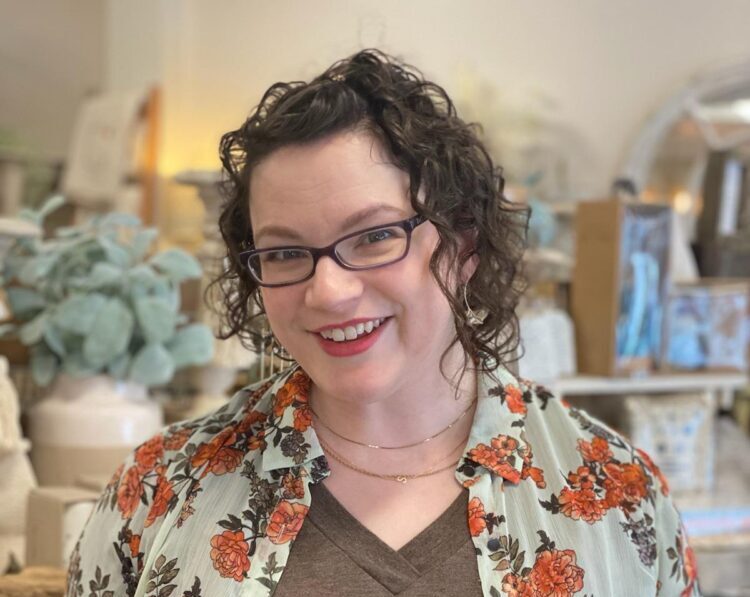The Glitch: Sarah’s Story
To celebrate the 13th anniversary of the Affordable Care Act (ACA), President Joe Biden and former President Barack Obama surprised a few people with a Zoom call — including Sarah Farren, whose life was forever changed when the Biden administration fixed the family glitch, which had prevented 5 million people from accessing affordable coverage options.
“I was genuinely shocked!” Sarah shared with us via email. “When I signed the petition to support changing the ACA, I was just doing what I normally do: sharing some details of my experience to help someone better understand my response. ‘Someone’ turned into ‘a whole lot of people’ very quickly!”
Sarah Farren doesn’t think of herself as being politically-minded. “I don’t go out of my way to see what’s wrong with the laws and make a change,” Sarah said. “I like to focus on my community and family.”
But that changed when Sarah and her husband, Andrew, decided to start a family. Prepared to become a full-time caretaker, Sarah left a lucrative career and looked into joining her husband’s employee-sponsored health care plan, which she assumed would be the most cost-effective route for her and her growing family.
Instead, she learned that getting on Andrew’s plan was prohibitively expensive. “We just couldn’t afford it,” Sarah said. “So then I had to go and shop for my own insurance [through the ACA Marketplace].”
As she explored plans in the Marketplace, Sarah discovered that she and her family had fallen into the so-called “family glitch” — a misinterpretation of the ACA in which families like the Farrens were deemed ineligible for tax credits to help pay for their health coverage, despite being eligible by all other accounts.
“So many people that I talked to would tell me: ‘I’m sure you’d qualify for a subsidy through the Affordable Care Act,’” Sarah said. “But I don’t think anybody that I talked to knew about the family glitch — no one had encountered that. Then I found out I wasn’t eligible [for subsidies]. And I thought, ‘What am I gonna do? This is really bad.’”
When Sarah and her family fell into the “family glitch,” Sarah felt cheated. Now, Sarah felt like she had to choose between the family she always wanted to grow with her husband and the money they needed to support one.

It’s not as if Sarah wasn’t prepared. She had known other people who were qualifying for tax credits for their health care plans, and had talked to a health care broker and her former employer’s HR team before deciding to leave her full-time job and start a family. And while Sarah says she was lucky to have some money in her health savings account (HSA) from her former employer she could access, she and her husband still had to drain their savings just to afford the basic care Sarah needed for her otherwise “medically unremarkable” pregnancy.
“I felt very stung by it for a long time. And I just said, Well, whatever, I have to have a child. We’re just gonna go ahead, and we’ll work it out later,” Sarah said. But eventually, Sarah saw an online petition from Community Catalyst about the family glitch that she signed and commented on.
Sarah wrote:
It breaks my heart that I have to choose between my family and my finances. I left a well-paying full-time job so that I would be able to raise our children myself instead of using daycare. I was worried about losing my health coverage through my employer. However, I knew a number of single, young professionals (who have a higher salary than my current combined household income) who qualified for tax credits on their health insurance. So, I thought I would be able to find more affordable coverage for myself when I left my job. When I found out I wasn’t eligible, it felt like I was being punished for choosing to have a family.
Soon after Sarah shared her story, Community Catalyst reached out to her directly. “They said, we saw your comments, and we wanted to see if you’d give testimony that we could use for a hearing with the IRS,” Sarah said. “I jumped on that because I thought — anything I could do to help — I think that it’s really important. Because I couldn’t believe that was the intention of the rule, right? I feel like I wanted to believe that it was an oversight because it just seemed too unfair.”
Since then, Sarah has been speaking up whenever she can to make sure people understand the ACA Marketplace, understand the benefits they are qualified and deserve to have, and that they advocate for themselves if they run into any barriers or challenges with enrollment.
“When I signed the petition to support changing the ACA, I was just doing what I normally do: sharing some details of my experience to help someone better understand my response,” Sarah said. ‘‘Someone’ turned into ‘a whole lot of people’ very quickly!” Not only that, but it reached the people who were actually in a position to make a change. Using the tools we have now, it’s easier than ever to share your experience with others. I didn’t think about it at the time, but that means it’s also easier than ever to make your voice a force for good.”